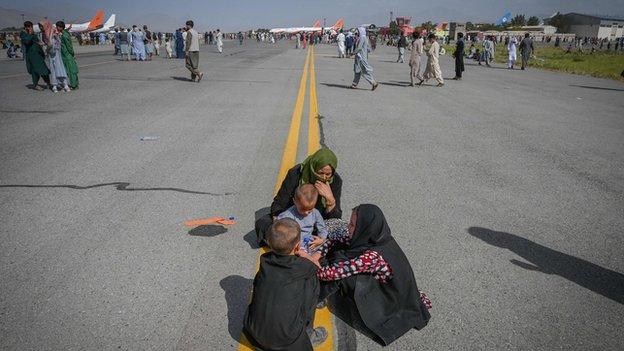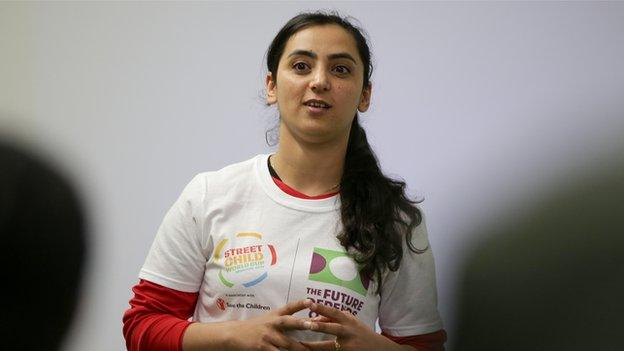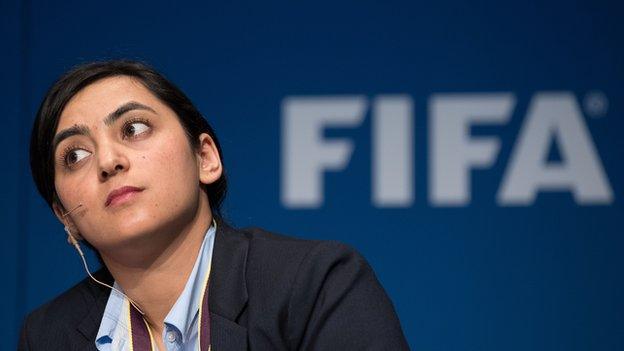Afghanistan: Former football captain fears for players left behind
- Published

Families with young children sit on the tarmac at Kabul airport hoping to be able to board a plane out of Afghanistan.
"I have not been able to sleep, I have been crying and feeling helpless."
Khalida Popal is the former Afghanistan national women's team captain and reflecting on the shocking developments that unfold in her home country as the Taliban return to power after 20 years.
Now based in Denmark, the women's team director is desperately trying to help and advise her players, fearing what the Taliban rule may mean for women in the country.
"I receive messages from players from Afghanistan who are crying, saying we are abandoned and stuck at home not able to get out, they are afraid," Popal, 34, tells BBC Sport. "All the dreams have just gone. It is just like a nightmare.
"Players are sending their videos and saying 'the people I talked against are now outside my door, I cannot breathe, I am so scared and I don't see any protection'.
"What is happening right now is back to square one. We feel the show is over."
Popal has closed down the national team's Twitter account to "protect" the team for fear of identifying current or past players - and she is advising players to delete their social media too.
"We encouraged women and girls to stand up and be bold, and now I am telling them to take photos down, shut down your social media and try to shut down their voices. This causes so much pain," she adds.
"The players have been so vocal, standing up for women's rights, and now their lives are in grave danger."

Khalida Popal helped form the first national team in 2007. But she has said the moment she became the leader of women's football in Afghanistan, her life was in danger. She left the country in 2011 and settled in Denmark in 2016.
Popal has lived in Denmark since leaving Afghanistan in 2011 and seeking asylum in 2016.
She says the withdrawal of international troops, led by US and UK forces, after a 20-year presence in her home country has now heavily compromised the safety of women and girls.
During their previous rule, from 1996 to 2001, the Taliban stopped girls from receiving any form of education.
Women were not able to leave the house without being accompanied by a male relative, were not allowed to work, were forced to wear a full body and face-covering burqa and punishments and beatings were commonplace for those who defied the extreme Islamist rulings.
Popal added: "After the last 20 years of women standing up for rights and freedom, we never thought we would be left alone. Those women took the risk, put their faces out there and now their identities are exposed.
"All we hear is 'we don't have national interest in Afghanistan anymore'. Nobody is talking about [protecting] the women activists, the players, the journalists who are at risk."

Popal was a speaker at the Fifa Annual Conference for Equality & Inclusion in 2017 and is now asking the body for help to protect the Afghan players.
Popal was pivotal in forming the first Afghanistan women's football team in 2007.
Despite having to keep their practices quiet so not to alert the Taliban forces, Popal and her team-mates soon realised football could be their chance to make a difference and inspire the next generation of female athletes in the country.
The team were accused of flouting religious beliefs, but knowing they were doing nothing wrong, they formed a national side.
Their first game was against an International Security Assistance Forces team at the Ghazi Stadium in Kabul in that same year. Afghanistan won 5-0 and, since then, the team have played multiple international matches.
"I remember we went to an international tournament and we stood under our flag," she told the BBC in 2017.
"I remember the first time we heard the national anthem, it was emotional. We were all crying because it was such a great achievement for us."
Four years later, Popal is now having to call upon sports bodies such as Fifa and the International Olympic Committee to show their support and help protect the people most at risk in Afghanistan - including the team she helped build.
"Help us protect those women whose identities are exposed. Help us get our players safe," she pleaded.

Ladhood Series 2 is here: A hilarious look at how lads become men is streaming now on BBC iPlayer
Why we all need our alter ego: How does the likes of Rafael Nadal channel theirs for better performance?
